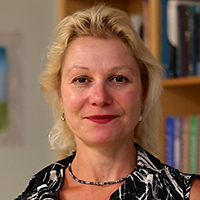
Julia R. Greer, California Institute of Technology
Julia Greer obtained her SB degree in Chemical Engineering with a minor in Advanced Music Performance from MIT in 1997 and a PhD degree in Materials Science from Stanford. She worked at Intel (2000-03) and was a post-doc at PARC (2005-07). Greer joined Caltech in 2007 and currently is a Ruben F. and Donna Mettler Professor of Materials Science, Mechanics, and Medical Engineering. Greer has more than 150 publications and has delivered over 100 invited lectures, including two TEDx talks, multiple plenary lectures and named seminars at universities, the Watson Lecture at Caltech, the Gilbreth Lecture at the National Academy of Engineering, the Midwest Mechanics Lecture series, and an “IdeasLab” at the World Economic Forum, and was recently selected as Alexander M. Cruickshank (AMC) Lecturer at the Gordon Research Conferences (2020). She received the inaugural AAAFM-Heeger Award (2019) and was named a Vannevar-Bush Faculty Fellow by the US Department of Defense (2016) and CNN’s 20/20 Visionary (2016). Her work was recognized among Top-10 Breakthrough Technologies by MIT’s Technology Review (2015). Greer was named as one of “100 Most Creative People” by Fast Company, a Young Global Leader by World Economic Forum (2014) and received multiple career awards: Kavli (2014), Nano Letters, SES, and TMS (2013); NASA, ASME (2012), Popular Mechanics Breakthrough Award (2012), DOE (2011), DARPA (2009), and Technology Review’s TR-35, (2008). Greer is the Director of the Kavli Nanoscience Institute at Caltech and serves as an Associate Editor for Nano Letters and Science Advances. Greer’s research focuses on creating and characterizing classes of materials with multi-scale microstructural hierarchy, which combine three-dimensional (3D) architectures with nanoscale-induced material properties.